八年级上册一般将来时
- 格式:doc
- 大小:46.00 KB
- 文档页数:3
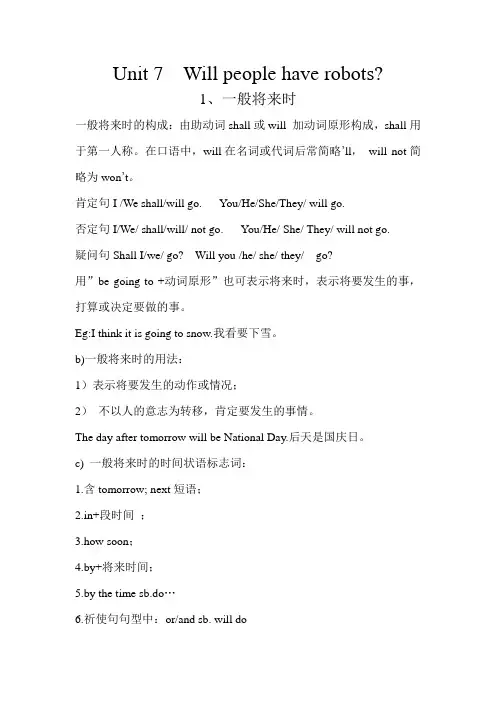
Unit 7 Will people have robots?1、一般将来时一般将来时的构成:由助动词shall或will 加动词原形构成,shall用于第一人称。
在口语中,will在名词或代词后常简略’ll,will not简略为won’t。
肯定句I /We shall/will go. You/He/She/They/ will go.否定句I/We/ shall/will/ not go. You/He/ She/ They/ will not go.疑问句Shall I/we/ go? Will you /he/ she/ they/ go?用”be going to +动词原形”也可表示将来时,表示将要发生的事,打算或决定要做的事。
Eg:I think it is going to snow.我看要下雪。
b)一般将来时的用法:1)表示将要发生的动作或情况;2)不以人的意志为转移,肯定要发生的事情。
The day after tomorrow will be National Day.后天是国庆日。
c) 一般将来时的时间状语标志词:1.含tomorrow; next短语;2.in+段时间;3.how soon;4.by+将来时间;5.by the time sb.do…6.祈使句句型中:or/and sb. will do7.在时间/条件状语从句中, 如果从句用一般现在时, 主句用将来时8.another dayin 与after的区别in是指以现在时间为起点的“在一段时间以后”。
也可以表示“在将来多少时间之内”,句子中的谓语动词要用一般将来时态;after常指以过去时间为起点的“一段时间之后”,所以它与过去时态连用。
当after指某个特定的未来时刻或日期之后,或指以将来某一时间为起点的若干时间之后时,它可以与将来时态连用。
例句:I'll be back in half an hour. 我半小时后就回来. 本句中的in 作"以后"解,不能用after代替。
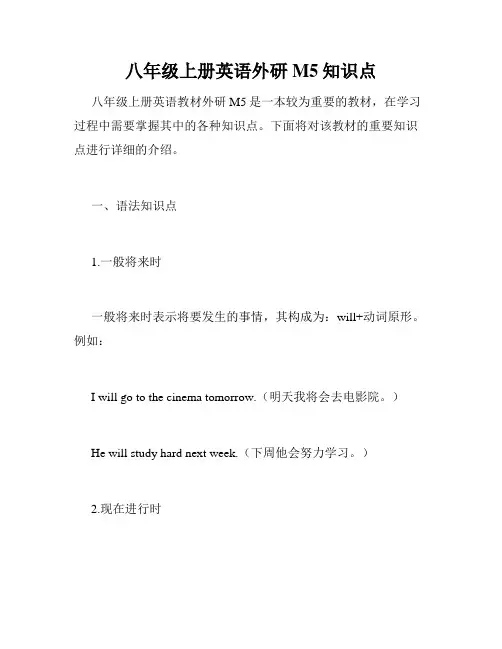
八年级上册英语外研M5知识点八年级上册英语教材外研M5是一本较为重要的教材,在学习过程中需要掌握其中的各种知识点。
下面将对该教材的重要知识点进行详细的介绍。
一、语法知识点1.一般将来时一般将来时表示将要发生的事情,其构成为:will+动词原形。
例如:I will go to the cinema tomorrow.(明天我将会去电影院。
)He will study hard next week.(下周他会努力学习。
)2.现在进行时现在进行时表示现在正在进行的事情,其构成为:am/is/are+现在分词。
例如:I am studying English now.(我正在学习英语。
)They are playing basketball at the playground.(他们正在操场上打篮球。
)3.形容词比较级形容词比较级表示两个事物之间的比较,其构成为:原级+er。
例如:Tall --- Taller(高的 --- 更高的)Smart --- Smarter(聪明的 --- 更聪明的)4.情态动词情态动词是用来表达某个动作的可能性、愿望等,包括can、could、may、might、shall、should、will、would、must等。
例如:I can swim very well.(我能游泳。
)She should finish her homework in time.(她应该及时完成作业。
)二、词汇知识点1.时间表达时间表达是重要的词汇知识点,在日常中会经常用到,例如:Monday(星期一)Tuesday(星期二)Wednesday(星期三)Thursday(星期四)Friday(星期五)Saturday(星期六)Sunday(星期日)2.健康健康词汇是重要的日常生活用语,需要掌握,例如:Healthy(健康的)Ill(生病的)Cold(感冒)Headache(头痛)Fever(发烧)三、阅读知识点阅读是英语学习中重要的环节之一。
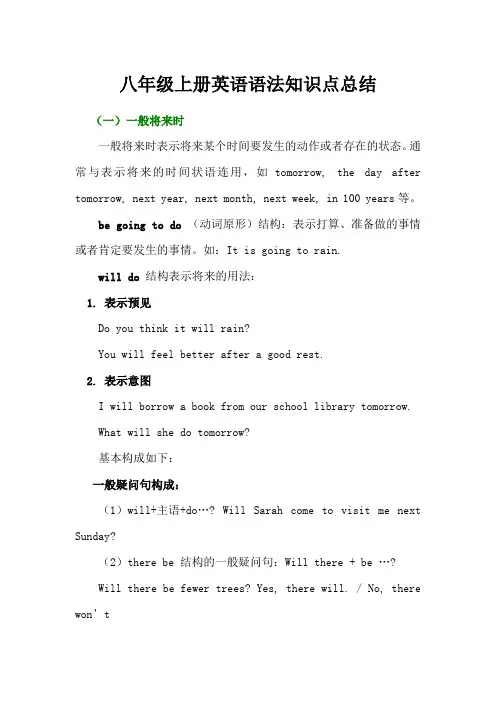
八年级上册英语语法知识点总结(一)一般将来时一般将来时表示将来某个时间要发生的动作或者存在的状态。
通常与表示将来的时间状语连用,如tomorrow, the day after tomorrow, next year, next month, next week, in 100 years等。
be going to do(动词原形)结构:表示打算、准备做的事情或者肯定要发生的事情。
如:It is going to rain.will do结构表示将来的用法:1. 表示预见Do you think it will rain?You will feel better after a good rest.2. 表示意图I will borrow a book from our school library tomorrow. What will she do tomorrow?基本构成如下:一般疑问句构成:(1)will+主语+do…? Will Sarah come to visit me next Sunday?(2)there be 结构的一般疑问句:Will there + be …?Will there be fewer trees? Yes, there will. / No, there won’t否定句构成:will + not (won’t)+doSarah won’t come to visit me next Sunday.特殊疑问句构成:特殊疑问词+will+主语+…?What will Sarah do next Sunday?练一练根据例句,用will改写下列各句例:I don’t feel well today. (be better tomorrow)I’ll be better tomorrow.1. Gina has six classes today. (have a lot of homework tonight)_____________________________2. I’m tired now. (sleep later)_____________________________3. My parents need a new car. (buy one soon)_____________________________4. We can’t leave right now. (leave a little later)_____________________________5. The weather is awful today. (be better tomorrow)_____________________________答案:1. She’ll have a lot of homework tonight.2. I’ll sleep later.3. They’ll buy one soon.4. We’ll leave a little later.5. Maybe it’ll be better tomorrow.(二)should的用法:should用来提出建议和忠告,后边加动词原形,否定句直接在should后边加not.例如:I think you should eat less junk food.我认为你应该少吃垃圾食品。
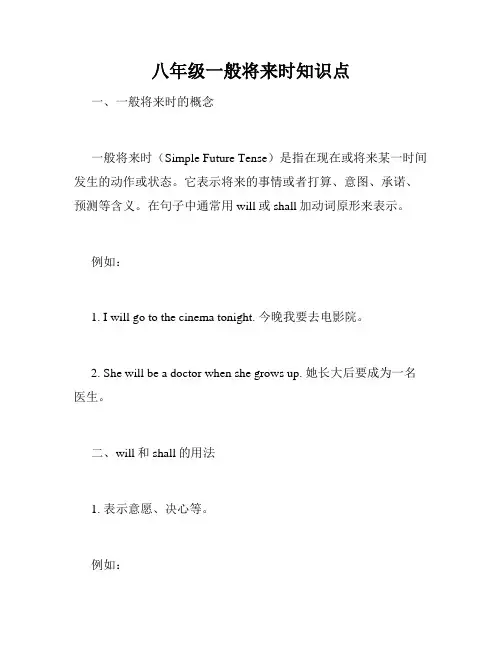
八年级一般将来时知识点一、一般将来时的概念一般将来时(Simple Future Tense)是指在现在或将来某一时间发生的动作或状态。
它表示将来的事情或者打算、意图、承诺、预测等含义。
在句子中通常用will或shall加动词原形来表示。
例如:1. I will go to the cinema tonight. 今晚我要去电影院。
2. She will be a doctor when she grows up. 她长大后要成为一名医生。
二、will和shall的用法1. 表示意愿、决心等。
例如:I will help you with your homework.我会帮你做作业。
2. 表示承诺或提议等用法。
例如:I shall be there on time.我会准时到那儿。
Shall we go to the park tomorrow?我们明天去公园好吗?3. 在口语中,will常用于表示将来事件。
例如:It will rain tomorrow.明天会下雨。
4. shall在现代英语中已经不常用,一般只在特殊疑问句或回答中使用。
例如:Shall I open the window?我该打开窗户吗?Yes, you shall.是的,你该打开。
三、构成方法形式:will / shall + 动词原形例如:I will go to Paris next month. 下个月我要去巴黎。
He shall be here soon. 他马上就要来了。
注意:一般将来时中,主语部分要与will或shall连用,不可以出现be动词或助动词do/does/did等。
四、常用的表示将来的时间状语1. tomorrow 明天例如:She will be back tomorrow. 她明天回来。
2. next week/month/year 下周/月/年例如:We will visit them next month. 我们下个月去探望他们。
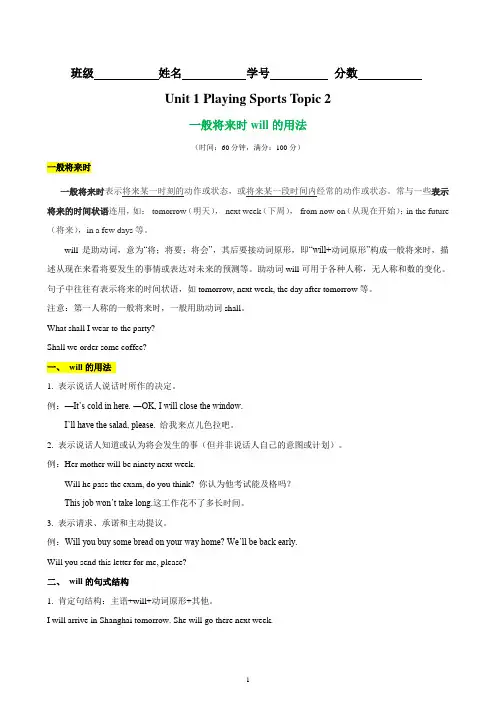
班级姓名学号分数Unit 1 Playing Sports Topic 2一般将来时will的用法(时间:60分钟,满分:100分)一般将来时一般将来时表示将来某一时刻的动作或状态,或将来某一段时间内经常的动作或状态。
常与一些表示将来的时间状语连用,如:tomorrow(明天),next week(下周),from now on(从现在开始);in the future (将来),in a few days等。
will是助动词,意为“将;将要;将会”,其后要接动词原形,即“will+动词原形”构成一般将来时,描述从现在来看将要发生的事情或表达对未来的预测等。
助动词will可用于各种人称,无人称和数的变化。
句子中往往有表示将来的时间状语,如tomorrow, next week, the day after tomorrow等。
注意:第一人称的一般将来时,一般用助动词shall。
What shall I wear to the party?Shall we order some coffee?一、will的用法1. 表示说话人说话时所作的决定。
例:—It’s cold in here. ―OK, I will close the window.I’ll have the salad, please. 给我来点儿色拉吧。
2. 表示说话人知道或认为将会发生的事(但并非说话人自己的意图或计划)。
例:Her mother will be ninety next week.Will he pass the exam, do you think? 你认为他考试能及格吗?This job won’t take long.这工作花不了多长时间。
3. 表示请求、承诺和主动提议。
例:Will you buy some bread on your way home? We’ll be back early.Will you send this letter for me, please?二、will的句式结构1. 肯定句结构:主语+will+动词原形+其他。
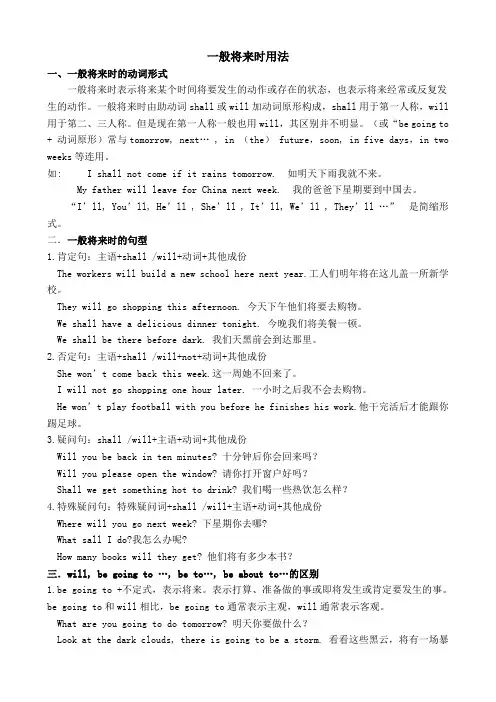
一般将来时用法一、一般将来时的动词形式一般将来时表示将来某个时间将要发生的动作或存在的状态,也表示将来经常或反复发生的动作。
一般将来时由助动词shall或will加动词原形构成,shall用于第一人称,will 用于第二、三人称。
但是现在第一人称一般也用will,其区别并不明显。
(或“be going to + 动词原形)常与tomorrow, next… , in (the) future,soon, in five days,in two weeks等连用。
如: I shall not come if it rains tomorrow. 如明天下雨我就不来。
My father will leave for China next week. 我的爸爸下星期要到中国去。
“I’ll, You’ll, He’ll , She’ll , It’ll, We’ll , They’ll …”是简缩形式。
二.一般将来时的句型1.肯定句:主语+shall /will+动词+其他成份The workers will build a new school here next year.工人们明年将在这儿盖一所新学校。
They will go shopping this afternoon. 今天下午他们将要去购物。
We shall have a delicious dinner tonight. 今晚我们将美餐一顿。
We shall be there before dark. 我们天黑前会到达那里。
2.否定句:主语+shall /will+not+动词+其他成份She won’t come back this week.这一周她不回来了。
I will not go shopping one hour later. 一小时之后我不会去购物。
He won’t play football with you before he finishes his work.他干完活后才能跟你踢足球。
![八年级上册Unit 7 Will people have robots[一般将来时]](https://uimg.taocdn.com/5e03f51130126edb6f1aff00bed5b9f3f90f727f.webp)
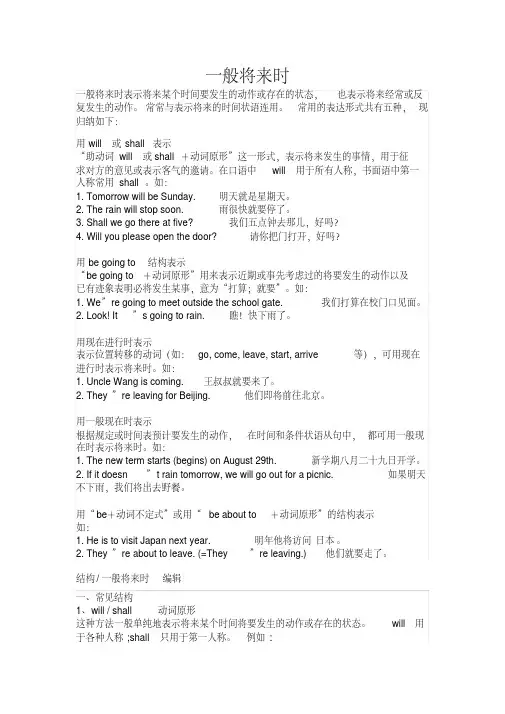
一般将来时一般将来时表示将来某个时间要发生的动作或存在的状态,也表示将来经常或反复发生的动作。
常常与表示将来的时间状语连用。
常用的表达形式共有五种,现归纳如下:用will或shall表示“助动词will或shall+动词原形”这一形式,表示将来发生的事情,用于征求对方的意见或表示客气的邀请。
在口语中will用于所有人称,书面语中第一人称常用shall。
如:1. Tomorrow will be Sunday. 明天就是星期天。
2. The rain will stop soon. 雨很快就要停了。
3. Shall we go there at five? 我们五点钟去那儿,好吗?4. Will you please open the door? 请你把门打开,好吗?用be going to结构表示“be going to+动词原形”用来表示近期或事先考虑过的将要发生的动作以及已有迹象表明必将发生某事,意为“打算;就要”。
如:1. We”re going to meet outside the school gate. 我们打算在校门口见面。
2. Look! It”s going to rain. 瞧!快下雨了。
用现在进行时表示表示位置转移的动词(如:go, come, leave, start, arrive等),可用现在进行时表示将来时。
如:1. Uncle Wang is coming. 王叔叔就要来了。
2. They”re leaving for Beijing. 他们即将前往北京。
用一般现在时表示根据规定或时间表预计要发生的动作,在时间和条件状语从句中,都可用一般现在时表示将来时。
如:1. The new term starts (begins) on August 29th. 新学期八月二十九日开学。
2. If it doesn”t rain tomorrow, we will go out for a picnic. 如果明天不下雨,我们将出去野餐。

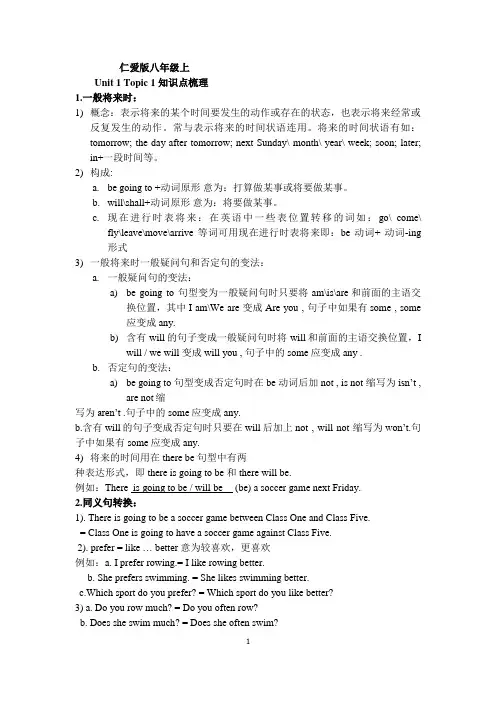
仁爱版八年级上Unit 1 Topic 1 知识点梳理1.一般将来时:1)概念:表示将来的某个时间要发生的动作或存在的状态,也表示将来经常或反复发生的动作。
常与表示将来的时间状语连用。
将来的时间状语有如:tomorrow; the day after tomorrow; next Sunday\ month\ year\ week; soon; later;in+一段时间等。
2)构成:a.be going to +动词原形意为:打算做某事或将要做某事。
b.will\shall+动词原形意为:将要做某事。
c.现在进行时表将来:在英语中一些表位置转移的词如:go\ come\fly\leave\move\arrive等词可用现在进行时表将来即:be动词+ 动词-ing形式3)一般将来时一般疑问句和否定句的变法:a.一般疑问句的变法:a)be going to 句型变为一般疑问句时只要将am\is\are和前面的主语交换位置,其中I am\We are 变成Are you , 句子中如果有some , some应变成any.b)含有will的句子变成一般疑问句时将will和前面的主语交换位置,Iwill / we will 变成will you , 句子中的some应变成any .b.否定句的变法:a)be going to 句型变成否定句时在be 动词后加not , is not 缩写为isn’t ,are not缩写为aren’t .句子中的some应变成any.b.含有will的句子变成否定句时只要在will后加上not , will not 缩写为won’t.句子中如果有some应变成any.4)将来的时间用在there be 句型中有两种表达形式,即there is going to be 和there will be.例如:There is going to be / will be (be) a soccer game next Friday.2.同义句转换:1). There is going to be a soccer game between Class One and Class Five.= Class One is going to have a soccer game against Class Five.2). prefer = like … better 意为较喜欢,更喜欢例如:a. I prefer rowing.= I like rowing better.b. She prefers swimming. = She likes swimming better.c.Which sport do you prefer? = Which sport do you like better?3) a. Do you row much? = Do you often row?b. Does she swim much? = Does she often swim?4).join in = take part in 意为:参加例如:a. Jane joined in the long jump.Jane took part in the long jump.b. She will join in the high jump.She will take part in the high jump.5). a. What’s your favorite sport?What sport do you like best?b. What’s her favorite subject?What subject does she like best?c. What’s his favorite color?What color does he like best?6). a. I like Yao Ming best.My favorite player is Yao Ming.b. She likes basketball best.Her favorite sport is basketball.c. Li Lei likes blue best.Li Lei’s favorite color is blue.7). Very much = a lot例如: a. I like English very much.I like English a lot.b. Thanks a lot.Thanks very much.8). be good at = do well inbe good at意为:擅长于…do well in 意为:在…方面做得好am / are good at = do well inis good at = does well in例如:a. I am good at swimming.I do well in swimming.b. She is good at drawing.She does well in drawing.9) spend / take / cost / pay 的区别。
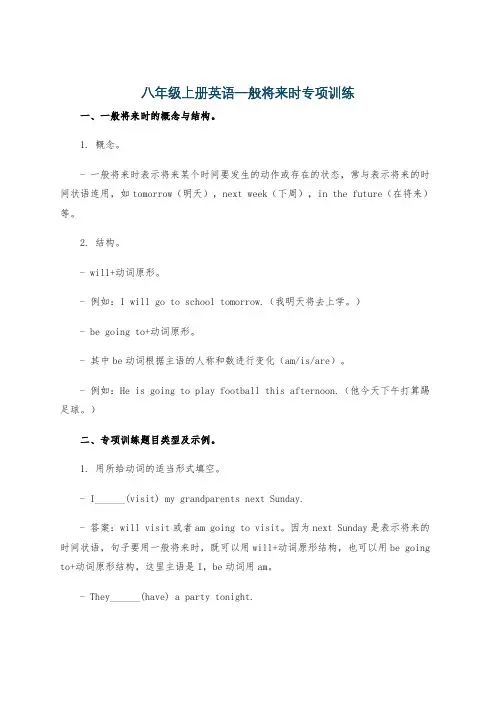
八年级上册英语一般将来时专项训练一、一般将来时的概念与结构。
1. 概念。
- 一般将来时表示将来某个时间要发生的动作或存在的状态,常与表示将来的时间状语连用,如tomorrow(明天),next week(下周),in the future(在将来)等。
2. 结构。
- will+动词原形。
- 例如:I will go to school tomorrow.(我明天将去上学。
)- be going to+动词原形。
- 其中be动词根据主语的人称和数进行变化(am/is/are)。
- 例如:He is going to play football this afternoon.(他今天下午打算踢足球。
)二、专项训练题目类型及示例。
1. 用所给动词的适当形式填空。
- I______(visit) my grandparents next Sunday.- 答案:will visit或者am going to visit。
因为next Sunday是表示将来的时间状语,句子要用一般将来时,既可以用will+动词原形结构,也可以用be going to+动词原形结构,这里主语是I,be动词用am。
- They______(have) a party tonight.- 答案:will have或者are going to have。
tonight表示今晚,是将来时间,主语是they,be动词用are。
2. 句型转换。
- He will play basketball tomorrow.(改为否定句)- 答案:He won't play basketball tomorrow.或者He is not going to play basketball tomorrow. 对于will结构的否定句,直接在will后面加not,缩写为won't;对于be going to结构,在be动词后面加not。
八年级上第七单元知识点详解(背诵记忆)Unit 7 How do you make a banana milk shake?一、重点语法:(理解记忆)will + 动词原形1.一般将来时(1)概念:一般将来时表示将要发生的事或者计划要做的事情。
(2)结构:(a)主语+be going to +动原+其他She is going to work hard next term. 下学期她打算努力学习。
(b)主语+ will +动原+其他eg: They will study at home on computers.他们将在家里用电脑学习(3)一般将来时的标志词:(a)next + 时间名词:next week/month/year(b)时间段+later: three days later(三天后)(c) in+时间段:in two years(两年后),in a week(d)其他:in the future(在未来), tomorrow, the day after tomorrow(后天)(4)例句:1.We’ll come to see you next week.(我们下周再见)2.Will people use money in 100 years ?(100年后人们还会使用现金吗?)3.How will the world be different in the future ?(未来世界将会有怎样的不同?)4.We won’t go to school tomorrow.(我们明天不去上学。
)(5)Will表示将来的句式结构肯定句: 主语+ will+ 动原+ 其他.Some day people will go to the moon.人类某一天将去月球。
否定句: 主语+ will+ not+动原+ 其他. (will not=won’t)They will not use books.他们将不再使用书。
人教版英语八年级上册Unit6-7语法重点:一般将来时专项讲解与练习一般将来时表示将来某一时段的动作或状态,或将来某一段时间内经常的动作或状态。
在英语时态中,"时"指动作发生的时间,"态"指动作的状态(形式)。
一般将来时常和表示将来的时间状语连用。
如:tomorrow(明天);next week(下周);in the future(将来);in a year(一年以后)等。
一般将来时通常由助动词will + 动词原形或用be going to + 动词原形构成。
例句:He will get married. 他就快结婚了。
She will have a daughter.她就会有个女儿了。
We are going to buy some books and pencils tomorrow. 明天我们要买一些书和铅笔。
1、由助动词will + 动词原形构成例句:He will graduate from Harvard University next year.他明年哈佛大学毕业。
Spring will come again.春天会再回来。
2、由be going to+动词原形构成。
这种结构表示“决定、打算要做什么事,或有迹象表明即将发生、可能会出现什么情况,有趋势,注定会,不限于指人的活动”。
例句:I am going to buy a new coat this winter.今年我打算买一件新大衣。
There is going to be a thunder-storm.将有一场雷暴雨。
The journey is going to be difficult.这次旅行将极为艰难。
【be going to和will的比较:】①will表示说话人认为、相信、希望或假定要发生的事,不含任何具体时间,可以指遥远的将来。
而be going to指有迹象表明某事即将发生或肯定会发生,通常表示很快就要发生的事情。
人教版英语八年级上册Unit6-7语法重点:一般将来时专项讲解与练习一般将来时表示将来某一时段的动作或状态,或将来某一段时间内经常的动作或状态。
在英语时态中,"时"指动作发生的时间,"态"指动作的状态(形式)。
一般将来时常和表示将来的时间状语连用。
如:tomorrow(明天);next week(下周);in the future(将来);in a year(一年以后)等。
一般将来时通常由助动词will + 动词原形或用be going to + 动词原形构成。
例句:He will get married. 他就快结婚了。
She will have a daughter.她就会有个女儿了。
We are going to buy some books and pencils tomorrow. 明天我们要买一些书和铅笔。
1、由助动词will + 动词原形构成例句:He will graduate from Harvard University next year.他明年哈佛大学毕业。
Spring will come again.春天会再回来。
2、由be going to+动词原形构成。
这种结构表示“决定、打算要做什么事,或有迹象表明即将发生、可能会出现什么情况,有趋势,注定会,不限于指人的活动”。
例句:I am going to buy a new coat this winter.今年我打算买一件新大衣。
There is going to be a thunder-storm.将有一场雷暴雨。
The journey is going to be difficult.这次旅行将极为艰难。
【be going to和will的比较:】①will表示说话人认为、相信、希望或假定要发生的事,不含任何具体时间,可以指遥远的将来。
而be going to指有迹象表明某事即将发生或肯定会发生,通常表示很快就要发生的事情。
一般将来时:一、由“will+动词原形”构成。
一般将来时表示将来某个时间要发生的动作或存在的状态,也表示将来经常或反复发生的动作,常与表将来的时间状语连用,如: tomorrow(明天),the day after tomorrow(后天), next…(下个……), soon(不久), one day(某天), from now(从今后), in (time)(在……时间之后),in the future(在将来)等。
最基本的结构:will / shall + 动词原形“主谓(宾)句型”的一般将来时:(shall 用于第一人称)肯定句:主语+ will +动词原形+(宾语)+其他成份People will have robots in their homes.否定句:在will 的后面加not即可。
will not = won’t People will not (won’t) have robots in their homes.一般疑问句:把will 提到句子主语之前,结尾变问号。
Will people have robots in their homes?特殊疑问句:特殊疑问词+will +主语+动词原形+其他成份?When will people have robots in their homes? 二、“There be”句型的一般将来时肯定句:There will be +名词+其他成份=There is /are going to be [注意]:无论后面加单数名词或复数形式,be都必须用原形。
There will be only one country.否定句:在will后面加not. There won’t be only one country.一般疑问句:把will提到there之前。
Will there be only one country?Yes, there will. / No, there won’t.三、be going to+动词原形a.表示打算、准备做的事。
例如:We are going to put up a building here.我们打算在这里盖一座楼。
How are you going to spend your holidays?假期你准备怎样过?b.表示即将发生或肯定要发生的事。
例如:I think it is going to snow. 我看要下雪了。
There’s going to be a lot of trouble about this. 这事肯定会有很多麻烦。
c.“will”句型与“be going to”句型,前者表示纯粹将来,后者表示打算、计划、准备做的事情,更强调主语的主观意愿。
例如:Tomorrow will be Saturday. 明天是周六了。
We are going to visit Paris this summer.今年夏天我们打算游览巴黎。
四、用be doing表示将来:主要意义是表示按计划、安排即将发生的动作,常用于位置转移的动词。
如:go,come,leave,arrive等,也可用于其他动作动词。
We are having fish for dinner.We are moving to a different hotel the day after tomorrow.这种用法通常带有表示将来的时间状语,如果不带时间状语,则根据上下文可表示最近即将发生的动作。
A: Where are you going?B: I am going for a walk. Are you coming with me?A: Yes,I am just coming. Wait for me.单选题( ) 1. There __________ a meeting tomorrow afternoon.A. will be going toB. will going to beC. is going to beD. will go to be( ) 2. Charlie ________ here next month.A. isn’t workingB. doesn’t workingC. isn’t going to workingD. won’t work( ) 3. He ________ very busy this week, he ________ free next week.A. will be; isB. is; isC. will be; will beD. is; will be( ) 4. There ________ a dolphin show in the zoo tomorrow evening.A. wasB. is going to haveC. will haveD. is going to be( ) 5. –________ you ________ free tomorrow?– No. I ________ free the day after tomorrow.A. Are; going to; willB. Are; going to be; willC. Are; going to; will beD. Are; going to be; will be ( ) 6. Mother ________ me a nice present on my next birthday.A. will givesB. will giveC. givesD. give( ) 7. – Shall I buy a cup of tea for you?–________. (不,不要。
)A. No, you won’t.B. No, you aren’t.C. No, please don’t.D. No, please.( ) 8. – Where is the morning paper?– I ________ if for you at once.A. getB. am gettingC. to getD. will get( ) 9. ________ a concert next Saturday?A. There will beB. Will there beC. There can beD. There are( ) 10. If they come, we ________ a meeting.A. haveB. will haveC. hadD. would have( ) 11. He ________ her a beautiful hat on her next birthday.A. givesB. gaveC. will givingD. is going to giving ( ) 12. He ________ to us as soon as he gets there.A. writesB. has writtenC. will writeD. wrote( ) 13. He ________ in three days.A. coming backB. came backC. will come backD. is going to coming back ( ) 14. – Will his parents go to see the Terra Cotta Warriors tomorrow?–No, ________ (不去).A. they willn’t.B. they won’t.C. they aren’t.D. they don’t.( ) 15. Who ________ we ________ swimming with tomorrow afternoon?A. will; goB. do; goC. will; goingD. shall; go( ) 16. We ________ the work this way next time.A. doB. will doC. going to doD. will doing( ) 17. The day after tomorrow they ________ a volleyball match.A. will watchingB. watchesC. is watchingD. is going to watch ( )18. There ________ a birthday party this Sunday.A. shall beB. will beC. shall going to beD. will going to be( )19. They ________ an English evening next Sunday.A. are havingB. are going to haveC. will havingD. is going to have( ) 20. ________ you ________ free next Sunday?A. Will; areB. Will; beC. Do; beD. Are; be( ) 21. He ________ there at ten tomorrow morning.A. willB. isC. will beD. be( ) 22. ________ your brother ________ a magazine from the library?A. Are; going to borrowB. Is; going to borrowC. Will; borrowsD. Are; going to borrows( ) 23. It ________ the year of the horse next year.A. is going to beB. is going toC. will beD. will is( ) 24. ________ open the window?A. Will you pleaseB. Please will youC. You pleaseD. Do you( ) 25. –Let’s go out to play football, shall we?– OK. I ________.A. will comingB. be going to comeC. comeD. am coming二、动词填空。